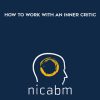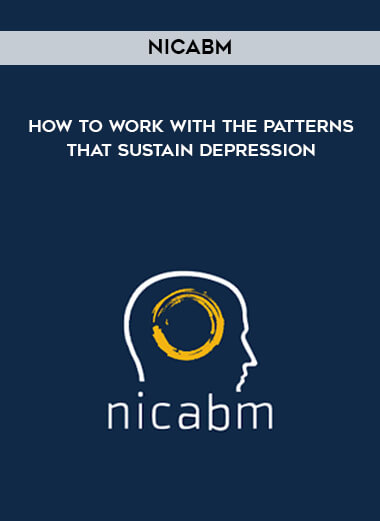NICABM – How to Work with the Patterns That Sustain Depression | Available Now !
$47.00 Original price was: $47.00.$18.00Current price is: $18.00.
NICABM – How to Work with the Patterns That Sustain Depression | Instant Download !
PLEASE CHECK ALL CONTENTS HERE:

Overcoming Barriers to Healing Depression
How to Disrupt the Patterns That Sustain Your Client’s Depression
Depression can overwhelm a client’s life and rob them of meaning, joy and a sense of value.
Left untreated, it can feel like a life sentence – like nothing will ever change.
So to successfully treat depression, we have to look at the issues that sustain it.
First, we have to look at low motivation, because without motivation it’s hard for a client to take any action, and lack of action can often foster feelings of shame.
Beyond that, we also need to break up the two critical thought patterns that can leave clients defenseless against depression’s power.
Trauma also plays a role in depression, and we need to look at the way it can trick the mind into shutdown.
15 top thought leaders shared their personal insights and strategies for working with depression and reducing relapse. We put all their practical ideas together into a brand-new program . . .
Brand New Short Course
How to Work with the Patterns That Sustain Depression
How to Work with Toxic Self-Narratives That Sustain Depression
Marsha Linehan, PhD
- A practical depression strategy for working with a client’s feeling of “nobody likes me”
- One way to break the harsh self-narrative that drives a client into depression
- How to help clients escape depression when their critical thoughts are based on a truth
How to Disrupt the Low Motivation Driving a Client’s Depression
Shelly Harrell, PhD Kelly McGonigal, PhD
- Why low motivation can often trap a client in shame
- Two aspects of low motivation that can sustain a client’s depression
Key Strategies to Disrupt Trauma-Driven Depression
Pat Ogden, PhD
- How the dorsal-vagal system can hold a client hostage to depression
- Why it’s vital to address both the body and the nervous system to correct a depression posture
- How to unhook the emotional trigger that sets off a depression response in the body
Critical Skills to Help Clients Avoid Depression Relapse
Christine Padesky, PhD Rick Hanson, PhD Bill O’Hanlon, LMFT
- Why your relapse plan could be the most critical part of therapy
- Two essential antidepressant skills that can significantly reduce depression relapse
- An important part of depression treatment that helps the client know when to activate their relapse plan
How to Break the Depression-Rigid-Thinking Loop
Lynn Lyons, LICSW Kelly McGonigal, PhD Rick Hanson, PhD
- The small language change that can break a client’s rigid depressive thought
- Why some clients with depression are more willing to talk about feelings (and the big reason you might want to avoid doing this)
How to Keep a Client’s Low Motivation From Sabotaging Treatment
Richard Schwartz, PhD Joan Borysenko, PhD
- Two ways depression shows up (and why it’s crucial to work with each one differently)
- The critical first step to prevent a client’s low motivation from sabotaging treatment
- What can go wrong if you focus on a client’s pain before addressing their low motivation
Overcoming Depression After a Major Life Loss
Marsha Linehan, PhD Ron Siegel, PsyD Joan Borysenko, PhD
- How to help clients find effective ways to alter their relationship with depression
- The “grieving pact” that allows clients to suffer while also helping them out of depression
Two Powerful Skills to Reduce a Client’s Depression Risk
Michael Yapko, PhD Kelly McGonigal, PhD
- How to resource clients struggling with depression so they can withstand change
- A common factor in depression treatment that results in higher success rates
- The number one reason a client with depression will leave therapy after the first session
How to Lead the Traumatized Brain Out of Depression
Bessel van der Kolk, MD
- A crucial first step for treating clients who are too shut down to feel any motivation
- How trauma can corrupt the “savings network” of the brain and leave a client more vulnerable to depression
- Why traditional therapy may be ineffective against shutdown patterns linked to depression
1 review for NICABM – How to Work with the Patterns That Sustain Depression | Available Now !
Add a review Cancel reply
Related products
NLP & Hypnosis
NLP & Hypnosis
NLP & Hypnosis
NLP & Hypnosis
Ecommerce
Ecommerce












Justus Johnson –
nice thank you | NICABM – How to Work with the Patterns That Sustain Depression